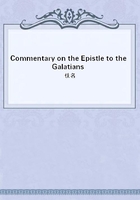
第47章
Whether reason hears that justification before God is obtained by grace alone, it draws the inference that the Law is without value. The doctrine of the Law must therefore be studied carefully lest we either reject the Law altogether, or are tempted to attribute to the Law a capacity to save.
There are three ways in which the Law may be abused. First, by the self-righteous hypocrites who fancy that they can be justified by the Law.
Secondly, by those who claim that Christian liberty exempts a Christian from the observance of the Law. "These," says Peter, "use their liberty for a cloak of maliciousness," and bring the name and the Gospel of Christ into ill repute. Thirdly, the Law is abused by those who do not understand that the Law is meant to drive us to Christ. When the Law is properly used its value cannot be too highly appraised. It will take me to Christ every time.
VERSE 24. Wherefore the law was our schoolmaster to bring us unto Christ.
This simile of the schoolmaster is striking. Schoolmasters are indispensable. But show me a pupil who loves his schoolmaster. How little love is lost upon them the Jews showed by their attitude toward Moses. They would have been glad to stone Moses to death. (Ex. 17:4.) You cannot expect anything else. How can a pupil love a teacher who frustrates his desires? And if the pupil disobeys, the schoolmaster whips him, and the pupil has to like it and even kiss the rod with which he was beaten. Do you think the schoolboy feels good about it? As soon as the teacher turns his back, the pupil breaks the rod and throws it into the fire. And if he were stronger than the teacher he would not take the beatings, but beat up the teacher. All the same, teachers are indispensable, otherwise the children would grow up without discipline, instruction, and training.
But how long are the scolding and the whippings of the schoolmaster to continue? Only for a time, until the boy has been trained to be a worthy heir of his father. No father wants his son to be whipped all the time. The discipline is to last until the boy has been trained to be his father's worthy successor.
The Law is such a schoolmaster. Not for always, but until we have been brought to Christ. The Law is not just another schoolmaster. The Law is a specialist to bring us to Christ. What would you think of a schoolmaster who could only torment and beat a child? Yet of such schoolmasters there were plenty in former times, regular bruisers. The Law is not that kind of a schoolmaster. It is not to torment us always. With its lashings it is only too anxious to drive us to Christ. The Law is like the good schoolmaster who trains his children to find pleasure in doing things they formerly detested.
VERSE 24. That we might be justified by faith.
The Law is not to teach us another Law. When a person feels the full force of the Law he is likely to think: I have transgressed all the commandments of God; I am guilty of eternal death. If God will spare me I will change and live right from now on. This natural but entirely wrong reaction to the Law has bred the many ceremonies and works devised to earn grace and remission of sins.
The Law means to enlarge my sins, to make me small, so that I may be justified by faith in Christ. Faith is neither law nor word; but confidence in Christ "who is the end of the law." How so is Christ the end of the Law?
Not in this way that He replaced the old Law with new laws. Nor is Christ the end of the Law in a way that makes Him a hard judge who has to be bribed by works as the papists teach. Christ is the end or finish of the Law to all who believe in Him. The Law can no longer accuse or condemn them.
But what does the Law accomplish for those who have been justified by Christ? Paul answers this question next.
VERSE 25. But after that faith is come, we are no longer under a schoolmaster.
The Apostle declares that we are free from the Law. Christ fulfilled the Law for us. We may live in joy and safety under Christ. The trouble is, our flesh will not let us believe in Christ with all our heart. The fault lies not with Christ, but with us. Sin clings to us as long as we live and spoils our happiness in Christ. Hence, we are only partly free from the Law. "With the mind I myself serve the law of God; but with the flesh the law of sin."
(Romans 7:25.)
As far as the conscience is concerned it may cheerfully ignore the Law. But because sin continues to dwell in the flesh, the Law waits around to molest our conscience. More and more, however, Christ increases our faith and in the measure in which our faith is increased, sin, Law, and flesh subside.